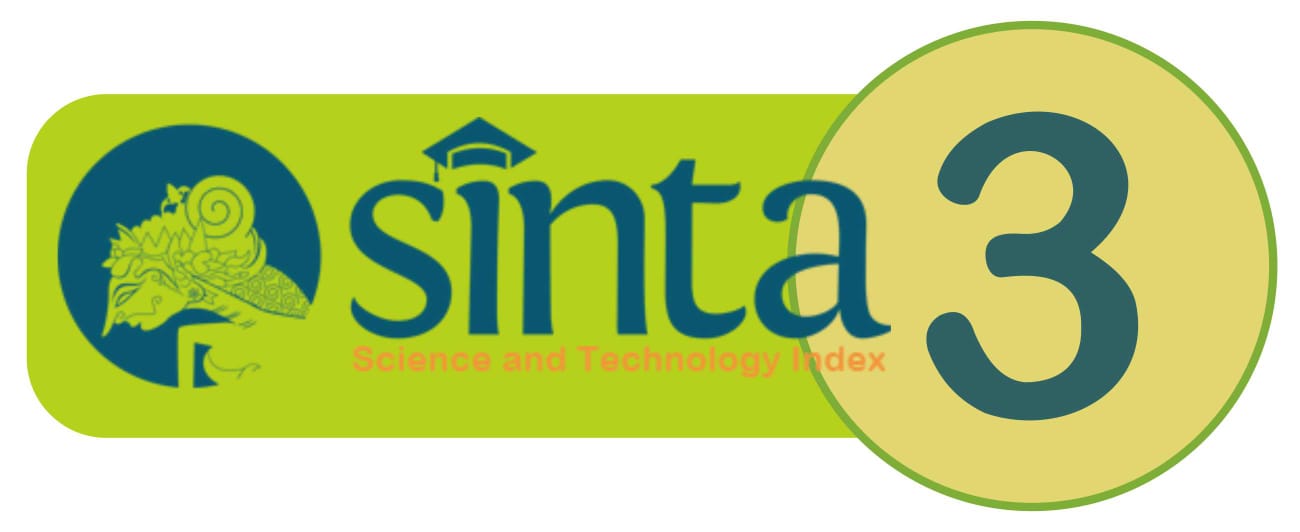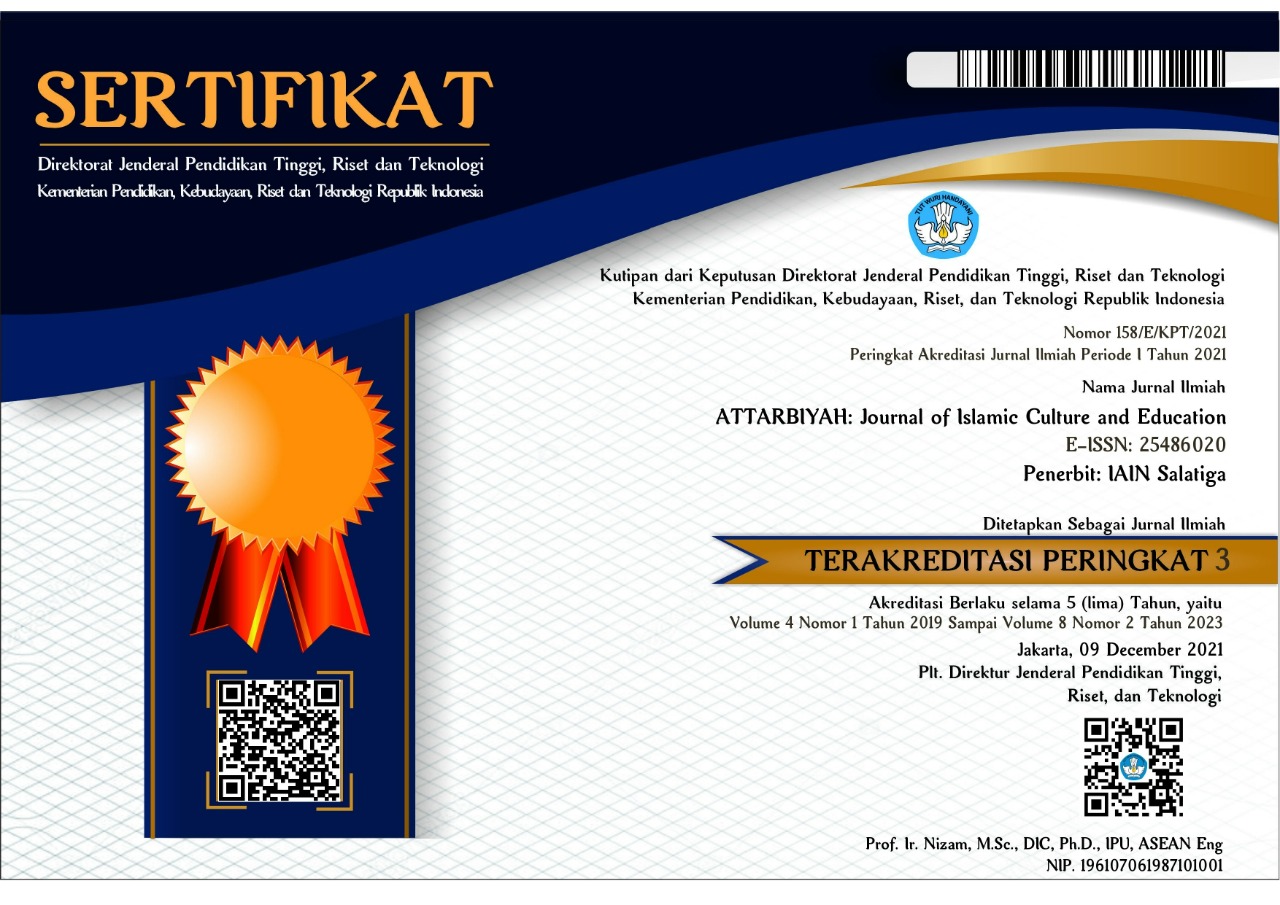Students’ perception on Islamic education toward e-learning classes during covid-19 pandemic
Abstract
The aim of this research is to find out the students’ perception of Islamic education course conducted online learning during a pandemic outbreak. This impact affects the learning process. The researchers used a qualitative research approach with a survey method and the data collection were gained through a questionnaire and interview which were conducted online. The participants in this study were 115 students from the even semester and of English Education Program in English for Islamic studies course from one of universities in Bogor, Indonesia, who had been involved in online learning during the Covid-19 pandemic. The results show that a hundred percent of the students of that program involved in online learning in 2020/2021 academic year. Moreover, the online media that students are most interested in when learning online are WhatsApp (40.3 %), Google Classroom (35.7 %), Telegram (12.4 %) and Zoom (4.4 %). In addition, according to the students’ perception if online learning was extended, some students were very happy, a number of students were unhappy, and a few students were less happy. Despite the fact that most students prefer to study in person (offline) at home, online learning has positive impact on students.
Keywords
Full Text:
PDFReferences
Ahsin, N., & Rahmawati, C. (2020). Virtual Learning And Students Motivation: Implementation The “Game Ranking 1st” Through Quizizz. ATTARBIYAH: Journal of Islamic Culture and Education, 5(2), 81–90. https://doi.org/10.18326/attarbiyah.v5i2.81-90.
Anhusdar, L. ode (2020). Persepsi Mahasiswa Piaud Terhadap Kuliah Online di Masa Pandemi Covid 19. KINDERGARTEN: Journal of Islamic Early Childhood Education,, 3(1), 44–58. https://doi.org/http://dx.doi.org/10.24014/kjiece.v3i1.9609.
Basyar, S. (2018). Pendidikan Islam di Era Globalisasi: Antara Konsepsi dan Aplikasi. Al-Idarah: Jurnal Kependidikan Islam VIII (I). http://dx.doi.org/10.24042/alidarah.v8i1.2989.
Carrillo, C., & Flores, M. A. (2020). COVID-19 and teacher education: a literature review of online teaching and learning practices. European Journal of Teacher Education, 43(4), 466–487. https://doi.org/10.1080/02619768.2020.1821184.
Chaeruman, U. A., Wibawa, B., & Syahrial, Z. (2018). Creating a Blended Learning Model for Online Learning System in Indonesia. International Journal of Engineering & Technology, 7(3.36), 156. https://doi.org/10.14419/ijet.v7i3.36.29098.
Darwis, D. (2019). English for Islamic Studies. Jakarta: Rajawali Press.
Eka, P., Suputra, D., Nitiasih, P. K., Made, I., & Paramarta, S. (2020). Kelas Daring Bahasa Inggris di Masa Pandemi: Sebuah Tantangan Pembelajaran. Seminar Nasional Riset Inovatif, 7, 110–118. https://eproceeding.undiksha.ac.id/index.php/senari/article/view/2129.
Fandiño, F. G. E., & Velandia, A. J. S. (2020). How an online tutor motivates E-learning English. Heliyon, 6(8). https://doi.org/10.1016/j.heliyon.2020.e04630.
Gao, L. X., & Zhang, L. J. (2020). Teacher Learning in Difficult Times: Examining Foreign Language Teachers’ Cognitions About Online Teaching to Tide Over COVID-19. Frontiers in Psychology, 11(September), 1–14. https://doi.org/10.3389/fpsyg.2020.549653.
Hamzah, A. R. (2017). Konsep Pendidikan dalam Islam
Perspektif Ahmad Tafsir. At-Tajdid, 1(1). Retrievedfromhttps://ojs.ummetro.ac.id/index.php/attajdid/article/view/336.
Hanafi, I. (2012). Orientasi Fikih dalam Pendidikan Islam. Al-Fikra: Jurnal Ilmiah Keislaman, 11(1), 16–35. https://doi.org/10.24014/af.v11i1.3850.
Huang, R., Tlili, A., Chang, T. W., Zhang, X., Nascimbeni, F., & Burgos, D. (2020). Disrupted classes, undisrupted learning during COVID-19 outbreak in China: application of open educational practices and resources. Smart Learning Environments, 7(1). https://doi.org/10.1186/s40561-020-00125-8
Hussein, S., & Barzani, H. (2021). The Role of Technology in ELL Classes in Turkish Republic of Northern Cyprus. International Journal of Language Education, 5(2), 30–39.
Jamaluddin, D., Ratnasih, T., Gunawan, H., & Paujiah, E., (2020) Pembelajaran Daring Masa Pandemik Covid-19 Pada Calon Guru: Hambatan, Solusi Dan Proyeksi. Karya Tulis Ilmiah, Lembaga Penelitian dan Pengabdian Kepada Masyarakat UIN Sunan Gunung Djati Bandung. Retrieved from https://core.ac.uk/download/pdf/305072868.pdf
Khan, R. M. I., Radzuan, N. R. M., & Farooqi, S.-H. (2021). Learners ’ Perceptions on WhatsApp Integration as a Learning Tool to Develop EFL Vocabulary for Speaking Skill. 5(2), 1–14.
Maskar, S. (2019). Persepsi Peserta Didik terhadap Metode Blended Learning dengan Google Classroom. Inovasi Matematika, 1(2), 110–121. https://doi.org/10.35438/inomatika.v1i2.156.
Muhaimin., S. (2015). Manajemen Pendidikan (Aplikasinya dalam Penyusunan Rencana Pengembangan Sekolah/Madrasah). Jakarta: Prenada Media. Retrieved from http://repository.uin-malang.ac.id/1709/
Munjiat, S. M. (2020). Implementation of Islamic Religious . (2020). Education Learning in. Nazhruna: Jurnal Pendidikan Islam, 3(2), 285–295. DOI: https://doi.org/10.31538/nzh.v3i2.757.
Mustofa, M. I. (2019). Formulasi Model Perkuliahan Daring Sebagai Upaya Menekan Disparitas Kualitas Perguruan Tinggi. Walisongo Journal of Information Technology, 1(2),, 151. https://doi.org/10.21580/wjit.2019.1.2.4067.
Saifuddin, M. F. (2018). E-Learning dalam Persepsi Mahasiswa. Jurnal Varidika, 29(2), 102–109. https://doi.org/10.23917/varidika.v29i2.5637.
Oraif, I., & Elyas, T. (2021). The impact of COVID-19 on learning: Investigating EFL learners’ engagement in online courses in Saudi Arabia. Education Sciences, 11(3), 1–19. https://doi.org/10.3390/educsci11030099
Purnawati, & Iskandar, I. (2019). Designing Ict Competences-Integrated Syllabuses of Grammar Courses for English Language Education Study Program. Ijlecr - International Journal of Language Education and Culture Review, 5(2), 104–115. https://doi.org/10.21009/ijlecr.052.12
Zawadka, J., Miękisz, A., & Nowakowska, I. (2021). Remote learning among students with and without reading difficulties during the initial stages of the COVID 19 pandemic. Education and Information Technologies, 0123456789. https://doi.org/10.1007/s10639-021-10559-3
DOI: https://doi.org/10.18326/attarbiyah.v6i1.15-29
Refbacks
- There are currently no refbacks.

ATTARBIYAH: Journal of Islamic Culture and Education by http://attarbiyah.iainsalatiga.ac.id/ is licensed under a Creative Commons Attribution-ShareAlike 4.0 International License
----------------------------------------------------------
ATTARBIYAH : Journal of Islamic Culture and Education IAIN SALATIGA p-ISSN: 0215-9996, e-ISSN: 2548-6020



